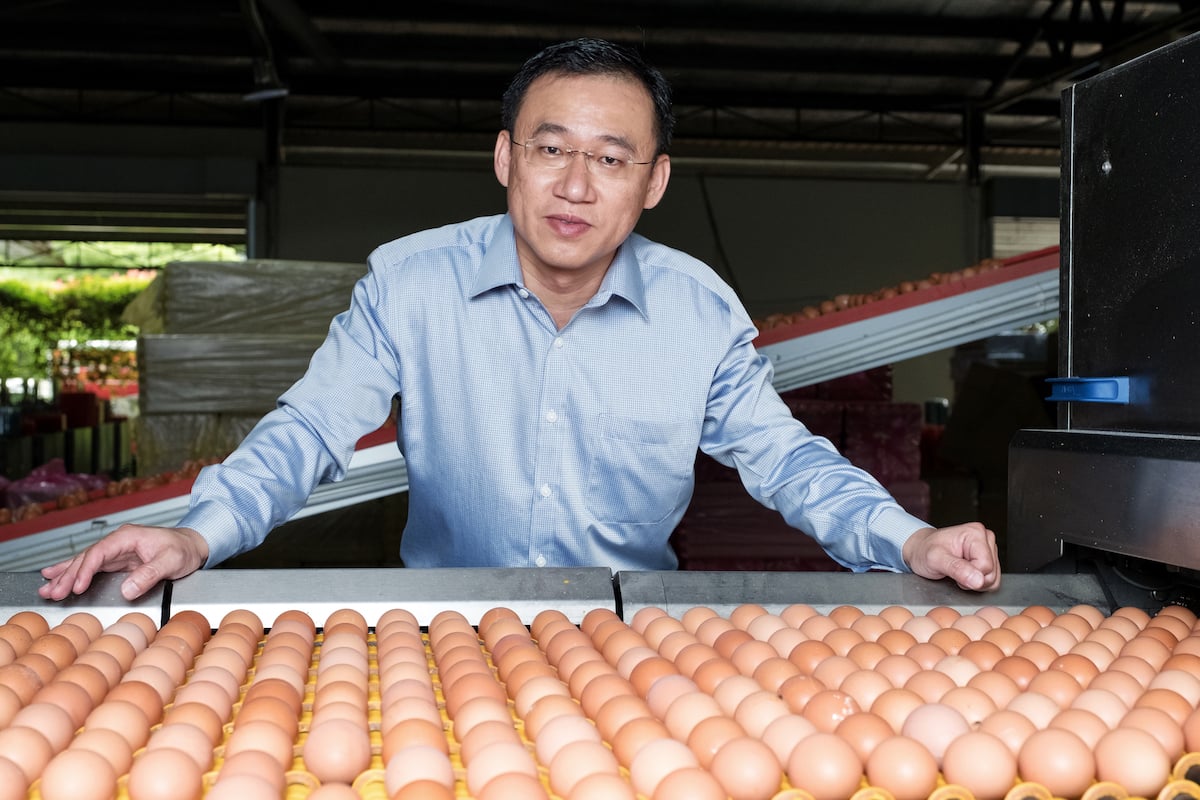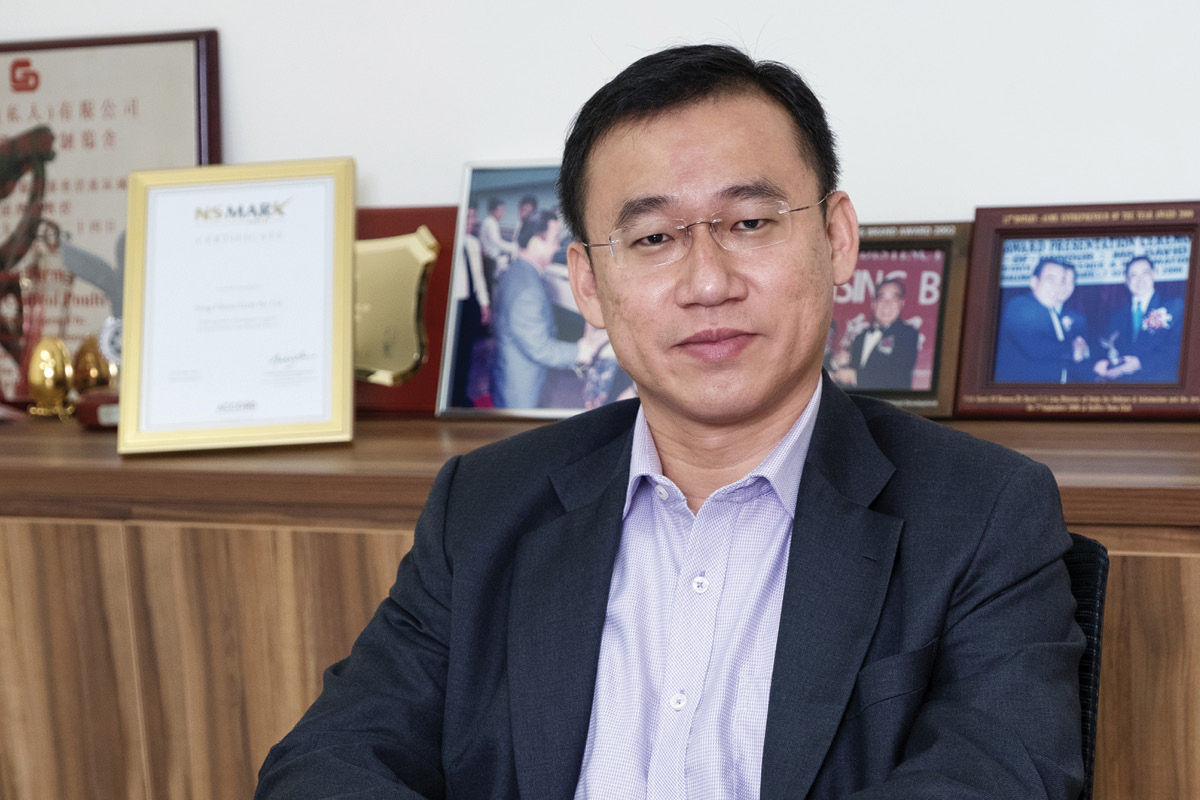While the stereotypical image of farming often involves a family settling into a site for multiple generations, in Singapore most agricultural leases are for a maximum of 20 years. This means a multigenerational business like Seng Choon Farm will often cycle through multiple sites.
Director Koh Yeow Koon oversaw the poultry farm’s move to its present site in 2010, and says the relocation was a positive as it now has greater capacity than before. “At the old site, we were doing 300,000 eggs a day. When we moved over, we had the capacity for 400,000 a day. Over the years, we have put in more capacity, and now we are at 600,000 eggs a day.”
This increased production is vital as Koh faces the challenge of new market entrants from overseas. “Our competitors in neighbouring countries can invest in land and property, and get some money back at the end of their tenure,” he says. “For us, it’s all leasehold, so naturally our costs are higher. From day one, we have to work for profit.”
The silver lining of short agricultural leases in Singapore is that a farm like Seng Choon is essentially forced to upgrade its technology each time it moves. “We keep renewing ourselves,” Koh explains. “Since our lease is short-to-medium term, it forces us to be continuously looking at the business. In a longer lease, you probably just keep going back to whatever technology you have invested in.”
Investing in technolgy
New technology at Seng Choon Farm includes a blood-spot detector that uses a high-intensity light to check for blood spots in eggs, and automatic detectors that have replaced the manual inspection of eggs. The farm has also implemented a computerised system that uses multiple cameras to take photos of eggs from 16 different angles. There is also a crack detector to screen eggs for hairline cracks.
This technology has driven efficiency gains, but it needs to be carefully implemented in consultation with the farm’s workers, Koh says. “Whenever I buy new equipment, I always consult my technicians, the people who use it, to find out what type of support they need and whether this equipment is suitable.

Sometimes, if you introduce a piece of technology that’s too far ahead of your needs and too far ahead of people’s comfort zone, they will just set it aside. Sometimes I do feel resistance from my people about changing the way they work, but when I talk to them and try to understand what their needs are, I feel that a change to more automation would be good. A change to tradition is good.”
This trend towards automation will only continue, with technology for automatic feeders and collection of eggs also being introduced. “We are looking at how to further reduce the reliance on labour and increase our productivity. Labour is an important issue in Singapore, not just in the poultry industry but nationwide.”
Competing on quality
Koh says Seng Choon Farm cannot afford to engage in price-based competition with Malaysian egg producers. Where it can compete, however, is on quality. “Fortunately, in the farming business, freshness counts and local produce counts. We can really bank on our freshness. We work with our delivery teams to distribute whatever we produce
on the same day.
Fortunately, in the farming business, freshness counts and local produce counts. We can really bank on our freshness.
“We try to maintain the freshest eggs on the shelf. With a strong background in feed milling, we worked on the feed formulation and we gave the chickens better feed. Because we invested in feed, our eggs will be fresh and high in quality.”
Seng Choon Farm has also claimed an edge over its competitors by marketing its product. “My father was the first in Singapore and maybe in Asia to market eggs, nearly 30 years ago,” Koh explains. “It was uncommon in this part of the world. It was only beginning to become common in America and Europe back then.”
Koh’s father saw a gap in the market and travelled to farms and trade shows in America to learn best practice in marketing eggs. It quickly became a key part of Seng Choon Farm’s business and it remains so today. “It’s important that we communicate to our customers that although our costs are high, we bring a high-quality and very fresh product. That’s why we can withstand competition from Malaysia.”
Another challenge in the poultry farming industry is managing biosecurity risks. Just as short-term leases are useful in forcing poultry farmers to embrace modern technology, Singapore’s stringent regulatory requirements have an upside for the farms. “The good thing about going through this process is that it helps the farm in terms of biosecurity. With all the certification, it really helps us towards being resourceful and having robust systems to ensure our biosecurity.”
Managing the response to biosecurity threats is just one challenge for the farm. “I think we are growing. We are trying to match the size of the operations to the market because, compared with other countries, Singapore is small. We are probably 10%–12% of the market, so it’s quite a nice size to maintain.”
Fresh is best
While the industry may be constantly evolving, the farm remains clear on its prime selling point. “Our focus has always been on delivering the freshest eggs. We will expand, but I don’t suppose we will go very far with more product lines. We don’t want niche products. What we want are fast-moving products that maintain their freshness and fly off the shelf. Consumers only buy fresh eggs.
“Fortunately, in the farming business, freshness counts and local produce counts. We can really bank on our freshness.”

